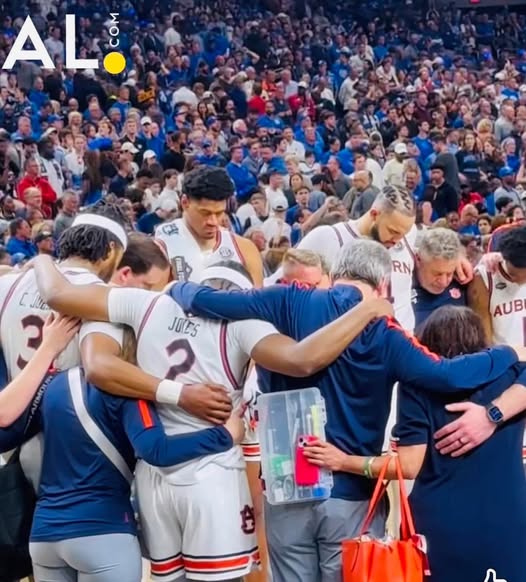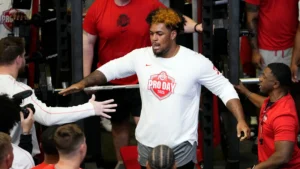
More Than a Game: Auburn’s Season of Faith, Brotherhood, and Sacrifice
There are moments in sports that transcend wins and losses. They stretch beyond stats, box scores, or championship banners. They touch something deeper—something more human. That moment came for the Auburn men’s basketball team not in a celebration, but in stillness—after the final buzzer of a heartbreaking loss to the Florida Gators. Heads bowed, arms locked, and eyes wet with emotion, the Tigers gathered mid-court not to mourn a lost dream, but to express gratitude—for each other, for the journey, and for something greater than themselves.
The Image That Stays
It’s the image that will stay burned into the memories of Auburn fans, players, and coaches. It’s the image that doesn’t need a scoreboard to tell the story. As players wept and embraced, one could feel the weight of the season and the beauty of the bond they had formed. Dylan Cardwell, a towering presence on the court and an even stronger spiritual leader off it, summed it up in a few whispered words that held profound meaning: “My prayer all year was for the Lord to prolong the season.”
For Cardwell, the game was never just about basketball. And as the tears flowed and the players huddled, it became clear that for this team, it never really was.
A Brotherhood Built on Faith
This year’s Auburn team was unlike any other. Yes, they had talent. They had size. They had speed, shooters, and stoppers. But more than anything, they had each other. What started as a group of young men brought together by basketball turned into a family bound by something far greater: faith.
From early morning practices to late-night bus rides, team prayers and devotionals became just as common as drills and film sessions. Coach Bruce Pearl, known for his intensity and passion on the court, encouraged his players to seek purpose in their play—not just performance. It was in that space that a culture of faith and brotherhood took root.
Players like Cardwell and others led the way, not only with their hustle and energy but with their hearts. They reminded each other that their identity was never found in wins or losses, but in who they were becoming through the process.
“This was the most loving team I have been on,” Cardwell said. And that love—raw, genuine, and rooted in something eternal—was what defined their season.
When Basketball Becomes Ministry
It’s easy to reduce college basketball to March Madness highlights and NBA draft predictions. But every once in a while, a team comes along that flips the script. This Auburn team saw the season as a mission field. They used the game to build relationships, deepen their faith, and support one another through adversity.
From hosting Bible studies to volunteering in the community, these players saw themselves as ambassadors of something greater. On social media, postgame interviews, and press conferences, they didn’t shy away from speaking about their faith. It wasn’t performative. It was personal.
“I’ve learned more about sacrifice this season than ever before,” said a senior player. “And you don’t really know sacrifice until you know Jesus Christ.”
These weren’t just postgame platitudes. They were the foundation of a team that saw every practice, every game, and every moment together as an opportunity to grow—not just as athletes, but as men of faith.
The Power of Sacrifice
Sacrifice is often measured in minutes played or shots taken. But for this Auburn team, it was measured in vulnerability, humility, and service. Players bought into their roles, even when it meant coming off the bench or giving up personal stats for team success. They celebrated each other’s victories and lifted each other up in defeat.
They learned to put others first. And in doing so, they became stronger. Not just on the scoreboard, but in spirit.
“When you understand the sacrifice of Christ,” Cardwell explained, “you begin to understand how to live for others.”
That perspective created a team chemistry that couldn’t be fabricated. It was felt in every huddle, seen in every assist, and heard in every prayer.
Faith in the Face of Defeat
The hardest part of any season is the end. For the Tigers, it came earlier than they had hoped. The loss to Florida in the NCAA Tournament was gut-wrenching. They had dreams of cutting down nets and bringing a national title back to Auburn. But instead, they found themselves on the wrong end of the scoreboard.
And yet, that loss revealed the true character of the team.
As the Gators celebrated, Auburn’s players gathered in a circle, arms wrapped around each other. They weren’t blaming. They weren’t complaining. They were praying.
In that moment, they gave thanks—not for the ending, but for the journey. Not for the trophy, but for the transformation.
“We wanted to glorify God no matter what happened,” said one of the team captains. “Even in defeat, we wanted to reflect His love.”
It was a powerful reminder that faith isn’t just for the mountaintop moments. It’s for the valleys too.
A Legacy Beyond the Court
This Auburn team may not be remembered for a championship banner, but they will be remembered for something far more enduring. Their legacy isn’t written in wins. It’s written in the lives they touched and the way they played—for each other, and for something higher.
Their season showed that sports can be a platform for growth, for ministry, and for impact. Young fans saw their heroes speak openly about their faith. Parents watched their sons grow into men who value character over clout. And a community rallied around a group of players who gave everything—not just for a title, but for a testimony.
In a world that often elevates ego and self-promotion, Auburn gave us something refreshing: humility, unity, and a reminder of what really matters.
Coach Pearl’s Guiding Hand
At the center of it all was Coach Bruce Pearl. A man known for his fire on the sidelines, he also nurtured the fire within his players. He gave them the space to lead with faith, to serve one another, and to grow as men. He challenged them not just to play harder, but to love deeper.
“This team made me proud—not just as a coach, but as a man of faith,” Pearl said after the season. “They reminded me that our calling goes far beyond the hardwood.”
Pearl’s leadership was instrumental in creating an environment where players felt safe to be themselves, to support one another, and to pursue a deeper purpose. Under his guidance, basketball became a classroom for life.
More Than a Moment
In the end, it’s easy to dismiss sports as just a game. But for those who lived this season—players, coaches, fans—it was so much more. It was a canvas for something eternal. A platform for brotherhood, sacrifice, and faith.
That image—of the Tigers huddled in prayer after their final game—will live on. It’s the kind of image that reminds us why we love sports in the first place. Not just for the thrill of victory, but for the power of unity, the beauty of purpose, and the strength of faith.
This Auburn team may have walked off the court without a championship, but they walked away with something even greater: a legacy rooted in love, sacrifice, and a deep, abiding belief that it was never just about basketball.
It was about something bigger.





